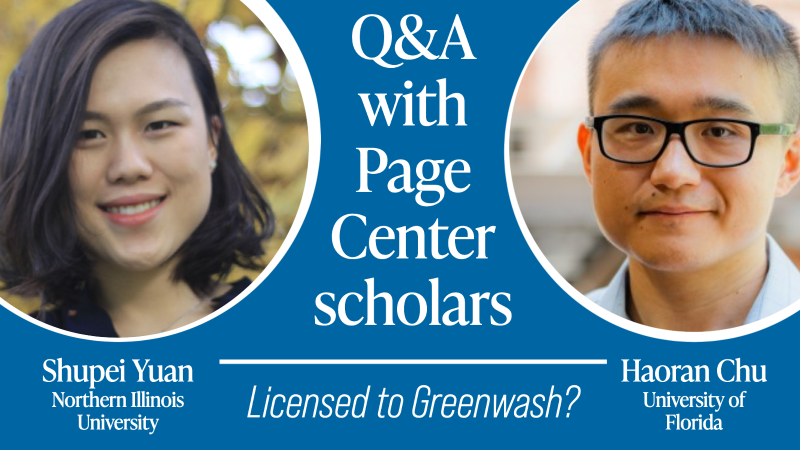How the public views corporate sustainability strategy – Scholar Q&A
June 12, 2023 • Jonathan McVerry

Today’s corporations are expected to have a response for the climate crisis. There is not, however, a clear framework for how to do that, especially given the drastic differences among major corporations. They serve different stakeholders, enact different mission statements and require different (if any) natural resources to operate. Scholars Shupei Yuan, associate professor at Northern Illinois University, and Haoran “Chris” Chu, assistant professor at the University of Florida, are leading a project to help companies shape a positive corporate image through strategic prosocial strategies. Specifically, they are examining how the public perceives corporate sustainability communications. The study is part of the Page Center’s 2023 call on prosocial communication. Yuan first became a Page Center scholar in 2021 with a project that built a framework for corporate social advocacy strategies.
How did this project come together – from you becoming collaborators to choosing a topic?
Yuan: We started off as friends who shared some research interests. We both understand there’s a knowledge gap and power differences between the people who make scientific decisions and the layperson or the public. We believe effective communication can help bridge the two parties.
Chu: We first met at a conference. That’s where we became friends and started collaborating. We have worked on several science communication-related projects since. Science is an important element in the process of moving corporations into a more sustainable world. The whole of society is transforming, and organizations can play a role. So, we were having this discussion about moral licensing (being OK with questionable behavior due to a history of moral behavior).
We were interested in how campaigns, especially those targeting sustainability, may be perceived by the public … and whether people will sanction the company’s past or ongoing transgressions, which could include not so sustainable behavior.
Can you share some examples that relate to your project?
Chu: Some companies’ core business is more sustainable than others, but they all face a similar level of pressure to make their business models more sustainable. We’re not measuring the sustainability potential, but the general public’s perception of a company’s sustainability efforts. We want to formalize these attitudes and make them testable.
Yuan: Based on the nature of a company, there is a different perception of its sustainability potential. Some companies have an easier time adjusting to be more environmentally friendly, like GAP, compared to others, for example, Shell or BP. So, when these companies put in the effort to be more sustainable, are people perceiving the effort differently in terms of perceived morality, sustainability, or hypocrisy? How people perceive the corporate response to different environmental issues is the question we want to explore.
Chu: We did a pilot study to investigate whether it is possible to assess people's perceived sustainability potential of different companies.
What did you learn from the pilot study and what are next steps?
Chu: There are indeed some differences between people's perception of different types of companies. But we used more extreme cases. We used oil makers at one end of the spectrum with lower sustainable potential and we used other companies like fast fashion companies as more sustainable counterparts In addition to this variable, we want to find out if similar campaigns explicitly targeting environmental protection and carbon neutrality would be perceived differently in a sustainability context as compared to non-carbon oriented or non-environment oriented campaigns.
We're not saying that a business model that is not super sustainable is immoral. The study is really about what the public's perception of a company's behavior is. We want to find out if the moral evaluation from the public will influence their perception of the company.
Yuan: The first step for us is to do a pretest to help us choose several companies that we can use in the main test. We want to get away from companies that people have strong opinions of already. That is something we plan to get done by the summer. So, when the fall starts, we can run the main test.
What are the goals and expectations upon completion?
Chu: We want to find out if doing something really works. Is there a mandate for every company to do something? When is it better to not do something or not to do something that people are asking you to do? People are applying moral judgments to companies … and it could be related to many other issues for U.S. corporations – not just sustainability.
Yuan: We believe a company’s involvement in this doesn't just benefit a company … it benefits our society, and it is a contribution to the environment and to the climate. It’s mutually beneficial. We consider ourselves science communication and public relations scholars, and we hope this study will lead to future studies that will give us answers and bridge that gap.
Discuss the Page Center’s role in supporting your research and helping make it a success.
Yuan: This grant provides us a good opportunity to investigate this topic further. It’s a chance to connect with scholars in public relations and science communication. I think this is a good opportunity for us to see what others are talking about in terms of corporate social advocacy. We appreciate this opportunity to move this topic further.
Chu: As someone who's in the PR department, we talk a lot of good things about the Page Center, and we look forward to more collaboration opportunities. It is a great venue to disseminate findings – our future findings, as well as the findings we have generated so far.

